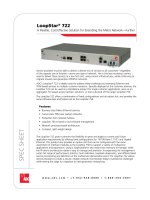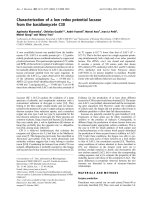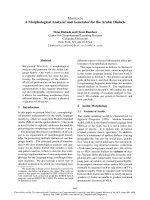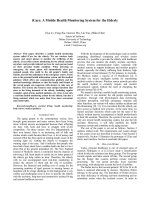A low cost bar grader for the harvestof hybrid striped bass (moronechrsops x m saxatilis)
Bạn đang xem bản rút gọn của tài liệu. Xem và tải ngay bản đầy đủ của tài liệu tại đây (247.24 KB, 6 trang )
Low Cost Bar Grader for the Harvest
of Hybrid Striped Bass (Morone
chrysops x M. saxatilis)
A
C.C. Easter1, L.A. Helfrich*1, A. Tate1, G.S. Libey1
1
Department of Fisheries and Wildlife Sciences
V irginia Polytechnic Institute and State University
Blacksburg, VA 24061 USA
*Corresponding Author, present address:
Department of Fisheries and Wildlife Sciences
152 Cheatham Hall
Virginia Polytechnic Institute and State University
Blacksburg, VA 24061 USA
Email:
ABSTRACT
Four bar graders were designed and built to separate a mixed-size
population of market-size reciprocal cross hybrid striped bass Marone
chrysops x M. saxatilis in rectangular culture tanks in an indoor,
recirculating aquaculture system. Grader frames were constructed of 5.1
cm (2 inch) PVC pipe and fittings. PVC electrical conduit (1.27 cm, 0.5
inch) was used to form a series of parallel, equally spaced vertical bars
within the frame. Bar slot spaces were 1.90, 2.54, 3.20, or 3.80 cm
(0.75, 1.0, 1.25, 1.5 inches). A strip of flexible vinyl siding was attached
to the outer edges of the bar grader to permit a tight fit between the
grader and tank walls, and prevent fish from swimming around the
grader. The graders were placed sequentially into one end of the tank,
largest slot size first, and maneuvered to the opposite end. Each grader
International Journal of Recirculating Aquaculture, Volume 3
5
remained in the tank for 60 min. Fish too large to pass through a grader
were netted and measured for weight, length and width. Regression
analysis was performed for average weight retained at each bar spacing
(Y = 7.13619 + 0.070716 X; r2 = .9987). By rearrangement, an equation
was derived which allows a culturist to select a bar spacing that retains
fish of a predetermined weight :
Grader bar slot size (mm)= Fish weight (g) -177.9
I
31.7)
Construction of each grader required approximately 2 h, and materials
cost $20.
INIRODUCTION
Striped bass Marone chrysops and their hybrids are cultured under
extensive or semi-intensive conditions in ponds, or at high densities in
raceways, recirculating water systems, or cages (Van Olst and Carlberg
1990; Trosclair 1992). Fish grown at high densities, including hybrid
striped bass, exhibit non-uniform growth (Nunley 1992; Bromage and
Shepherd 1990). Variable growth within a year-class often leads to low
feed conversion efficiency and survival (Huner et al. 1984, Kirby et al.
1987). Therefore, grading of small fish during growout is necessary to
increase size uniformity and reduce cannibalism (Smith et al. 1985).
However, grading can be labor intensive and injurious to fish, making it
economically unattractive to culturists. As a result, a mixed-size
population often exists at harvest. Commercial hybrid striped bass
markets often demand fish of uniform size because of intended product
use and customer desires. Therefore, fish culturists must selectively
harvest from a mixed population only those individuals meeting size
requirements of the buyer.
Panel graders, grader boxes, grading baskets, sorting or grading tables,
mechanical pumps with graders, and live cars or socks are common tools
designed to separate fish into size categories (Jensen 1990). The
preferred sorting method is dictated by the size and species of fish and
farm conditions (Huner et al. 1984). Fish may be graded from a variety
of culture vessels, including ponds, raceways, tanks, or holding vats.
Panel graders are the most common technique separating fish of various
sizes in raceways and rectangular tanks. They are constructed as a
6
International Journal of Recirculating Aquaculture, Volume 3
vertical or angled assembly of equally-spaced, parallel bars. Aluminum
is the most common construction material (Jensen 1990). Fish are
separated by girth according to their ability to pass through the spaces
between bars (Huner et al. 1984). Bar space-fish size relationships for
small, fingerling (83 to 163 mm; 3.3 to 6.4 inch) striped bass have been
developed (Ludwig and Tackett 1991), but have not been determined for
market-size (>260 mm; >10.2 inch) striped bass. This paper describes an
inexpensive, easily constructed, bar grader used to separate live, market
size hybrid striped bass into specified size gradations using two laborers.
l\1EIHODS
Four bar grader panel frames of 152 x 152 cm (60 x 60 inches) were
constructed of 5.1 cm (2 inch) PV C pipe and fittings. Parallel, vertical
bars were built of 1.27 cm, PVC conduit and spaced (internal slot
distance) at 1.90, 2.54, 3.20, or 3.80 cm (0.75, 1.0, 1.25, 1.5 inch)
intervals. Bars were attached to the grader frame by drilling 1.27 cm (0.5
inch) sockets into the top and bottom of the frame and inserting the
partially flexible PV C, allowing 360 degree rotation of the bars. The
grader frame and bars were inclined at a 45° angle and supported on a
PVC base (Figure 1). Inclined bars facilitated fish passage and reduced
entrapment by redirecting fish movement downward and through the
bars. Holes were drilled in the bar grader base to allow water entry,
sinking of the grader, and to prevent fish from swimming under the
frame. Flexible 0.64 cm (0.25 inch), vinyl house siding was attached to
the sides of the grader frame to provide a close fit against the tank walls.
The production tank (1.53 m x 6. llm x 1.22 m; 4.9 x 19.7 x 3.9 feet)
was part of a 12,390 L (3,261 gal) recirculating fish culture system at the
Virginia Tech Aquaculture Center.
Hybrid striped bass (n=300), length (TL) 271.3± 27.7 mm (mean±
SE), weight 288.9± 98.7 g, and width 39.3± 6.3 mm, were size-sorted
by sequentially placing the graders (largest to smallest slot size) into one
end of the culture tank and slowly sliding each, one at a time, completely
to the opposite end. Each of the 3 grading trials took a total of 240 min ,
or 60 min for each of the 4 slot sizes tested. Fish not passing through
each sequential grade were removed by net, weighed (nearest 0.1 g), and
measured for total length and maximum width (nearest mm) (Table 1).
International Journal of Recirculating Aquaculture, Volume 3
Table 1. Total mean weight (g),
+!-SE, length (mm), and width (mm) of hybrid striped
bass retained in sequential grading of a mixed-size population (n=300)
Bar Space (cm)
Weight (g)
Width (mm)
Length (mm)
3.80 - 3.20
387.4 +/- 51.9
45.3 +/- 2.4
298.6 +/- 13.8
3.20 - 2.54
301.5 +/- 58.7
39.8 +/- 2.8
277.6 +/- 15.5
2.54 - 1.90
237.2 +/- 62.4
35.5 +/- 3.7
258.9 +/- 20.5
Figure 1. Low-cost bar grader
Water level
\
\
\
\Inclined at
45° angle
Vinyl seal
8
International Journal of Recirculating Aquaculture, Volume 3
RESULTS and CONCLUSIONS
Regression analysis was performed (SAS Institute 1985) with mean
fish weights against bar width. An equation describing this line (Y=
177.9 + 31.7 X; r2= 0.9968) was developed and can be used to predict
the appropriate slot-size for selection of fish of a certain size:
Slot size (mm)= Fish Weight (g)- 177.9 I 31.7
By substituting the desired fish weight into the equation, the fish
culturist can determine the appropriate bar spacing to retain harvest-size
reciprocal hybrid striped bass from a population of mixed size. The bar
grader harvesting system was inexpensive ($20 per grader) and
constructed in approximately 2 h. The graders were highly mobile and
maintenance is expected to be low. Two individuals were needed to
push the grader through the rectangular tanks. Harvest-sized fish can be
graded in an hour, and handling minimized to netting and removing big
fish. This relatively low-cost grader system can be used to harvest and
selectively sort (by weight or length) striped bass and other commonly
cultured fish species once the initial relationships between grader bar
spacing and fish sizes (weight or length) retained are validated.
International Journal of Recirculating Aquaculture, Volume 3
9
REFERENCES
Bromage, N., Shepherd, J. 1992. Intensive Fish Farming. Blackwell
Scientific Publications, Cambridge, MA, USA
Huner, J.V., Dupree, H.K., Greenland, D.C. 1984. Harvesting, Grading,
and Holding Fish. In Third Report to the Fish Farmers: The Status of
Warmwater Fish Farming and Progress in Fish Farming Research.
Dupree, H.K. and Huner, J.V., Eds., 1984. U.S. Fish and Wildlife
Service, Washington, D.C., USA.
Kirby, J.H., Hinshaw, J.M., Huish, M. T. Increased Growth and
Production of Striped Bass x W hite Bass Hybrids in Earthen Ponds.
Journal of the World Aquaculture Society 1987.18, 35-43.
Jensen, G.L. 1990. Sorting and Grading Warmwater Fish. Southern
Regional Aquaculture Center, Publication No. 391. Mississippi State
University, Stoneville, MS, USA.
Ludwig, G.M., Tackett, D.L. Relation Between Bar Grader Size and Size
of Striped Bass. The Progressive Fish Culturist 1991. 53, 128-129.
Nunley, C.E. 1992. Production of Hybrid Striped Bass (Marone chrysops
x M. saxatilis) in a Recirculating Aquaculture System. Master's
thesis, Virginia Polytechnic Institute and State University,
Blacksburg, VA, USA
SAS Institute. 1985. SAS/STAT Guide for Personal Computers, 6th
edition. SAS Institute Inc., Cary, NC, USA.
Smith, T.I.J., Jenkins, W.E., Snevel, J.F. Production Characteristics of
Striped Bass (Marone saxatilis) and F l, F2 Hybrids (M. Saxatilis x
M. chrysops) Reared in Intensive Tank Systems. Journal of the
World Mariculture Society 1985.16, 57-60.
Trosclair, C. U.S. Aquaculture Production Nearing $1 Million. Water
Farming Journal 1992. 7( JO), 5.
Van Olst, J.C., Carlberg, J.M. Culture of Hybrid Striped Bass.
Aquaculture Magazine 1990. 16(1), 49-59.
10
International Journal of Recirculating Aquaculture, Volume 3









